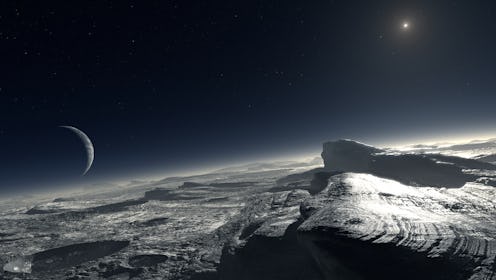News
Welcome Back, Pluto!

Remember that grade school mnemonic "My Very Educated Mother Just Served Us Nine Pizzas," designed to help us remember our planets Mercury, Venus, Earth, Mars, Jupiter, Saturn, Uranus, Neptune, Pluto? Well, we were cruelly forced to memorize it only to have Pluto booted from planet to dwarf planet status in 2006. But after a recent debate at the Harvard-Smithsonian Center for Astrophysics, the audience voted for Pluto to be a planet once again, arguing that its demotion had been based on some pretty questionable rationale.
The Harvard debate, aptly called "Is Pluto a Planet?", invited three planetary science experts to present arguments on both sides. When all was said and done, the audience was asked to vote for or against reinstating Pluto as a planet. Pluto's planetary status won the vote in a landslide victory. In the end, the consensus was based not so much on Pluto's decidedly planetary character but on the arbitrariness of the decision to downgrade it. In fact, the simple concept of the planet, as history can attest, has never been clear.
The first debater, historian of science Owen Gingerich, noted that the word planet is derived from the Greek word for wanderer. In the beginning, many objects qualified as planets based on this definition, including the sun, moon, and asteroids, and over time scientists would reevaluate and change their minds about what qualified as planets countless times. Including in 2006, when they demoted poor Pluto.
Why Pluto Got the Boot
In 2006, during the International Astronomical Union's 26th General Assembly, the organization voted to oust Pluto from the planetary ranks. Prior to the official decision, pressure had already been mounting, starting back in the 1990s, as astronomers discovered more and more Pluto-like objects beyond Neptune, including Eris, which is even bigger than Pluto. Thus, if Pluto qualified as a planet, then they'd have to appoint hundreds of these similar objects as planets as well.
Gareth Williams, associate director of the IAU’s Minor Planet Center, argued in the debate that allowing Pluto to be a planet would mean increasing the number of planets to "the possibility of 50 or 100 within the next decade," arguing that it wouldn't be fair to ask schoolchildren to remember so many. Oh, and I suppose forcing them to remember all those kings and battles during the Middle Ages is?
In the end, Pluto was demoted from planet to dwarf planet.
The Qualifications of a Planet, According to the IAU
So in order to avoid having to name, record, and examine 100 new planets, the IAU justified their decision with a set of scientific criteria that would henceforth be applied to any prospective planet. In order to qualify as a planet, an object must be a celestial body that, according to the IAU:
- It is in orbit around the Sun.
- Has sufficient mass for its self-gravity to overcome rigid body forces so that it assumes a hydrostatic equilibrium (nearly round) shape — in other words, it's large enough to be round.
- Has cleared the neighborhood around its orbit, meaning its orbital path is relatively free of other objects.
Pluto, whose orbital path is littered with some other objects, does not meet the third standard.
The Argument For Reinstating the Little Guy
Besides the fact that we all grew up considering Pluto a planet and nobody likes change, Dr. Dimitar Sasselov, director of the Harvard Origins of Life Initiative, presented convincing arguments during the debate for reinstating it as a planet. He offered his own definition of a planet: "The smallest spherical lump of matter that formed around stars or stellar remnants." According to this definition, Pluto would qualify as a planet.
But he's not married to that definition. Dr. Sasselov also pointed out that since scientists have discovered thousands of planets orbiting stars beyond the Sun, establishing a definition before we further examine what formed these bodies would be premature. So, for now, "we should keep Pluto as a planet by default."
Images: Lunar and Planetary Institute/Flickr, Wikipedia Commons (3)